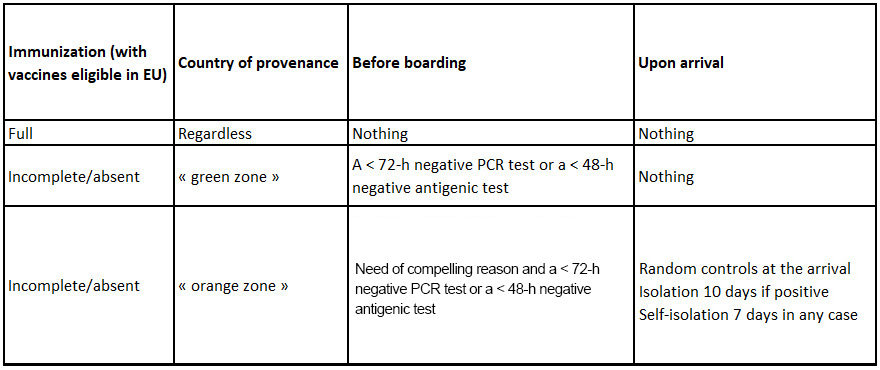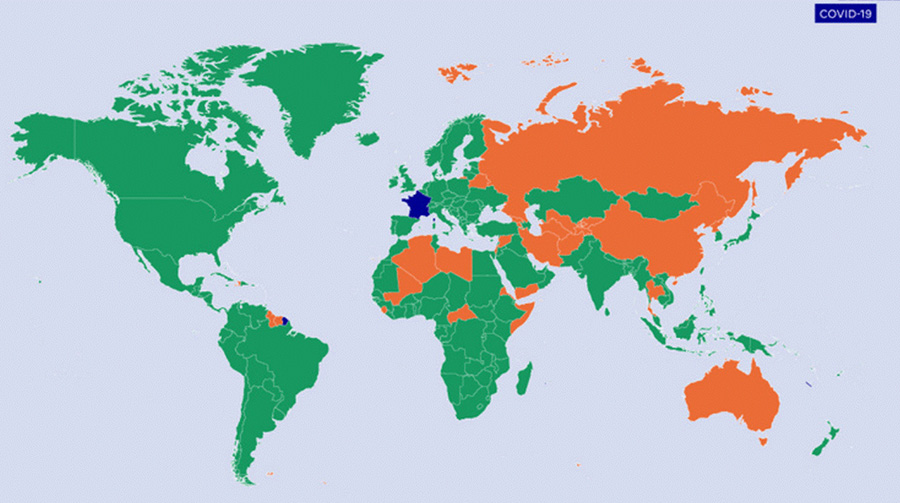Updated on May 18th 2022
The following information is likely to be changed according to the COVID context (national & international). Please check this page from time to time.
We strongly recommend you to check which COVID certificates you need before coming to France and verify now which COVID vaccines are eligible in France. France accepts all the vaccines eligible in EU, but also Covishield: Pfizer/Comirnaty, Moderna/Spikevax, AstraZeneca/Vaxzevria/Covishield, Johnson&Johnson, Novavax/Nuvaxovid. A full immunization (with three doses) is highly recommended to facilitate both visit and stay in France. Any other vaccines are not accepted in France, but your stay can be possible if you are tested COVID-negative before boarding.
Note that MMiN society could recommend the wearing of a mask during the meeting according to the health context.
Visa and COVID
If you are non-EU citizens, you must refer to the following sites:
https://www.diplomatie.gouv.fr/en/coming-to-france/coming-to-france-your-covid-19-questions-answered/
https://france-visas.gouv.fr/en/
https://www.diplomatie.gouv.fr/en/coming-to-france/requesting-a-visa/
Please, check the color codes of your country. The following table shows the current situation (updated April 25th).


If you need an invitation letter, please contact mmin2022@univ-lyon1.fr
COVID prevention tools in France
From March 14th 2022, both wearing of a mask and providing a COVID certificate (either a full immunisation scheme or a partial immunisation scheme coupled to a <6-month COVID recovery) are not mandatory in almost all closed places welcoming people (restaurants, museums, indoor events, meetings, emergency services, etc.).
COVID certificate in France (> 16 years old)
For almost all situations and in emergency health services, the COVID certificate (passe sanitaire, displayed in a QR code format) is not required from March 14th 2022. However, note that a COVID certificate can be asked in the other services of hospitals and healthcare centers.
COVID certificate to attend MMiN meeting
Unless unforeseen event, no COVID certificate will be asked to attend MMiN meeting. However, respect as much as possible some barrier measures: wear a mask to cover coughs and sneezes, keep your hands clean, avoid to shake hands, avoid kisses, blow your nose in a single-use tissue.
How to get a COVID certificate available in France (for hospitals and health centers, except emergency services)
EU citizens can use the EU Digital COVID Certificate as a digital proof.
If you have not been vaccinated in a European Union Member State, Albania, Andorra, Faroe Islands, Holy See, Iceland, Israel, Liechtenstein, Monaco, Morocco, North Macedonia, Norway, Panama, San Marino, Switzerland, Turkey, Ukraine or the United Kingdom (England and Wales, Northern Ireland, and Scotland), these countries issue EU Digital COVID Certificates or an equivalent that are accepted by France.
For the other non-EU citizens, a specific system has been put in place to issue a QR code valid as a COVID certificate in France. Please see the following link for details:
Applying for a COVID certificate if you were vaccinated abroad (procedure for non-European nationals entering France and non-European students) - Ministry for Europe and Foreign Affairs (diplomatie.gouv.fr)
Sources: French Ministry for Europe and Foreign Affairs; French Gouvernement
The following information is likely to be changed according to the COVID context (national & international). Please check this page from time to time.
We strongly recommend you to check which COVID certificates you need before coming to France and verify now which COVID vaccines are eligible in France. France accepts all the vaccines eligible in EU, but also Covishield: Pfizer/Comirnaty, Moderna/Spikevax, AstraZeneca/Vaxzevria/Covishield, Johnson&Johnson, Novavax/Nuvaxovid. A full immunization (with three doses) is highly recommended to facilitate both visit and stay in France. Any other vaccines are not accepted in France, but your stay can be possible if you are tested COVID-negative before boarding.
Note that MMiN society could recommend the wearing of a mask during the meeting according to the health context.
Visa and COVID
If you are non-EU citizens, you must refer to the following sites:
https://www.diplomatie.gouv.fr/en/coming-to-france/coming-to-france-your-covid-19-questions-answered/
https://france-visas.gouv.fr/en/
https://www.diplomatie.gouv.fr/en/coming-to-france/requesting-a-visa/
Please, check the color codes of your country. The following table shows the current situation (updated April 25th).


If you need an invitation letter, please contact mmin2022@univ-lyon1.fr
COVID prevention tools in France
From March 14th 2022, both wearing of a mask and providing a COVID certificate (either a full immunisation scheme or a partial immunisation scheme coupled to a <6-month COVID recovery) are not mandatory in almost all closed places welcoming people (restaurants, museums, indoor events, meetings, emergency services, etc.).
However, note that wearing a mask and a COVID certificate will be asked in the hospitals and some health centers (except emergency rooms).
From May 16th 2022, please note that wearing a mask is not asked, but recommended in all public transportation (trains, subways, tramways, bus, trolleybus, planes, etc.).
Respect as much as possible some barrier measures: wear a mask to cover coughs and sneezes, keep your hands clean, avoid to shake hands, avoid kisses, blow your nose in a single-use tissue.COVID certificate in France (> 16 years old)
For almost all situations and in emergency health services, the COVID certificate (passe sanitaire, displayed in a QR code format) is not required from March 14th 2022. However, note that a COVID certificate can be asked in the other services of hospitals and healthcare centers.
COVID certificate to attend MMiN meeting
Unless unforeseen event, no COVID certificate will be asked to attend MMiN meeting. However, respect as much as possible some barrier measures: wear a mask to cover coughs and sneezes, keep your hands clean, avoid to shake hands, avoid kisses, blow your nose in a single-use tissue.
How to get a COVID certificate available in France (for hospitals and health centers, except emergency services)
EU citizens can use the EU Digital COVID Certificate as a digital proof.
If you have not been vaccinated in a European Union Member State, Albania, Andorra, Faroe Islands, Holy See, Iceland, Israel, Liechtenstein, Monaco, Morocco, North Macedonia, Norway, Panama, San Marino, Switzerland, Turkey, Ukraine or the United Kingdom (England and Wales, Northern Ireland, and Scotland), these countries issue EU Digital COVID Certificates or an equivalent that are accepted by France.
For the other non-EU citizens, a specific system has been put in place to issue a QR code valid as a COVID certificate in France. Please see the following link for details:
Applying for a COVID certificate if you were vaccinated abroad (procedure for non-European nationals entering France and non-European students) - Ministry for Europe and Foreign Affairs (diplomatie.gouv.fr)
Sources: French Ministry for Europe and Foreign Affairs; French Gouvernement